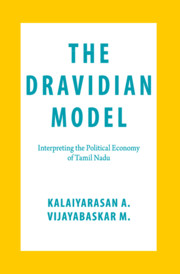Book contents
- Frontmatter
- Dedication
- Contents
- List of Tables
- List of Figures
- List of Abbreviations
- Acknowledgements
- 1 The Dravidian Model: An Introduction
- 2 Conceptualising Power in Caste Society
- 3 Democratising Education
- 4 Democratising Care
- 5 Broadening Growth and Democratising Capital
- 6 Transforming Rural Relations
- 7 Popular Interventions and Urban Labour
- 8 Fissures, Limits and Possible Futures
- Bibliography
- Index
7 - Popular Interventions and Urban Labour
Published online by Cambridge University Press: 08 July 2021
- Frontmatter
- Dedication
- Contents
- List of Tables
- List of Figures
- List of Abbreviations
- Acknowledgements
- 1 The Dravidian Model: An Introduction
- 2 Conceptualising Power in Caste Society
- 3 Democratising Education
- 4 Democratising Care
- 5 Broadening Growth and Democratising Capital
- 6 Transforming Rural Relations
- 7 Popular Interventions and Urban Labour
- 8 Fissures, Limits and Possible Futures
- Bibliography
- Index
Summary
In the last chapter we argued how traditional rural labour relations were destabilised and new opportunities opened up for lower castes due to a set of measures informed by Dravidian common-sense. Identity-based mobilisation was not merely about a politics of recognition but also a politics of redistribution that ensured a degree of material improvement in rural Tamil Nadu. In this chapter, we turn to ask: How did such mobilisation shape the material conditions of urban and non-agrarian labour in the state? Given the different institutional embedding of formal and informal labour, we make a distinction between interventions and outcomes in the two labour market segments. Establishing that the condition of labour in both formal and informal segments is relatively better than in other states characterised by industrial dynamism, we map a set of processes that made this possible. The study of Tamil Nadu's interventions in the domain of urban labour, we argue, suggests a solution to an interesting puzzle. A state which embraces economic reforms including the key tenets of labour market flexibility also does relatively better with regard to wages, working conditions and social protection for labour in both organised and unorganised sectors. Tamil Nadu's commitment to liberalisation has been accompanied by a relatively higher degree of social protection of informal workers.
Apart from secondary data and literature, the chapter also relies on detailed interviews with trade union officials, labour bureaucrats, activists and professionals employed in the software sector. We observe that the state has a relatively better share of decent jobs in the labour market, better wages and conditions of work. Importantly, while the state has not been able to counter the process of contractualisation of labour that we witness all over the country, it has nevertheless managed to contain it. The share of wages in organised manufacturing too is higher vis-à-vis other states in India. We explain such relatively better conditions for labour in terms of collective mobilisation and better embedding of the state's political regime in the interests of the lower castes and labouring classes. While Left unions and the DMK-affiliated Labour Progressive Front (LPF) played an important role in mobilisation, political regimes tend to respond to such demands better than in other industrially dynamic states.
- Type
- Chapter
- Information
- The Dravidian ModelInterpreting the Political Economy of Tamil Nadu, pp. 173 - 209Publisher: Cambridge University PressPrint publication year: 2021



